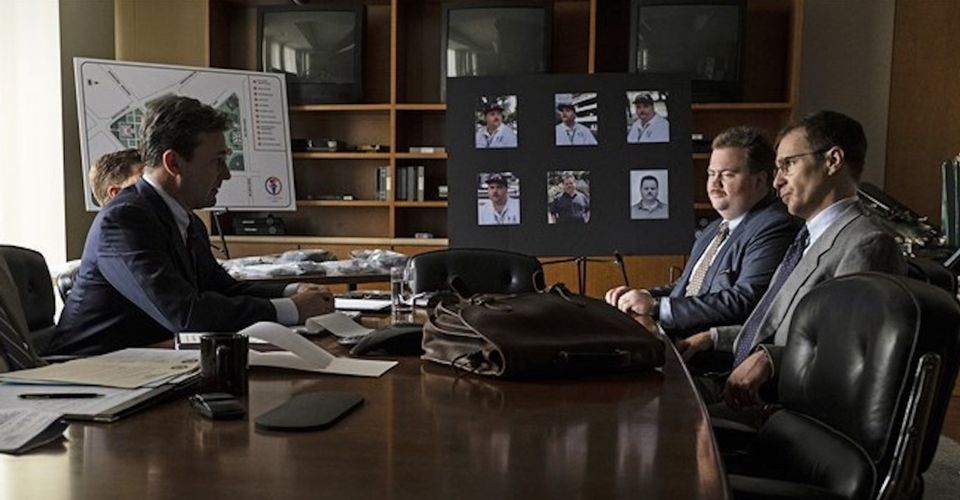Richard Jewell: 5 Truths & 5 Fabrications Used In The New Biopic

Even with the arrival of the newest Star Wars movie, Richard Jewell has taken the film industry by storm this month. While it features terrific performances and is beautifully made, Clint Eastwood’s latest film also comes with plenty of controversy. At its core, Richard Jewell is an underdog story of how Jewell goes from unlikely hero to falsely accused, to finally vindicated.
Most of the details on the film’s main character are true, but in the process of clearing Jewell’s name, the film destroys the reputation of one real-life Atlanta journalist and depicts FBI agents in a negative light. Here are five truths and five fabrications from Richard Jewell.
10 Truth: Richard Jewell discovered the bomb because of his dedication to protocol

The film’s main character is shown to be meticulous to a fault, almost to the point of annoyance, especially to his former employer at Piedmont College, but that is why Jewell discovered the bomb in Centennial Park. Jewell takes the suspicious bag, which ended up being the bomb, more seriously than other officers on the scene. The way the film describes that is accurate.
The movie also correctly showed Jewell performing his job to keep as many people safely away from the bomb as possible. The explosion killed one woman and injured 100 others. A cameraman also died from a heart attack while running to the bomb site.
9 Fabrication: Kathy Scruggs Didn’t Sleep with FBI Agent for Scoop

Although the female reporter Oliva Wilde plays in the film has been described by former co-workers as “flirtatious,” and “a police groupie” who wore “short skirts,” there’s no factual evidence that the character (Kathy Scruggs) slept with an FBI agent in exchange for the name of the man law enforcement was investigating, who was Jewell. Any journalist violating such an obvious code of ethics should be considered utter scum. For Eastwood to include this fabricated detail from the script was extremely irresponsible.
Scruggs died in 2001 from a prescription drug overdose, so she cannot defend herself from this defamation, but her former employer, the Atlanta-Journal Constitution, has defended her. The AJC wrote a letter to Warner Bros. asking for the film to acknowledge that its depictions of Scruggs were fictionalized. Warner Bros. responded, calling the claims baseless, which could lead to the AJC filing a lawsuit. How ironic it is that a film meant to tell the “real truth” about a falsely accused man would inaccurately portray another character.
8 Truth: Jewell Had an Obsession with Law Enforcement

Other aspects of Jewell’s personality such as his strong admiration for law enforcement was accurate. Police also really did arrest him for impersonating a law officer, and Jewell received the wrath of employers because of his obsession with following protocol.
Jewell really owned an unusual amount of firearms and hollowed-out hand grenades he used as paperweights too. These key details made him appear guilty both in real life and the film, but they were just corky details that made Jewell a unique character.
7 Fabrication: AJC Didn’t Rush to Publish the Story

In addition to her unethical behavior, the film depicts Scruggs as a yellow journalist, itching to print any type of story that would sell. That’s also a lie according to AJC editor-and-chief Kevin Riley. The film showcases Scruggs and the AJC as rushed to get the story published to beat the competition. But Riley explained in an op-ed last month that the newspaper held the story an extra day while it obtained confirmation to the original scoop.
Riley also wrote that Scruggs’ co-writer on the piece, Ron Martz, read the entire story to an FBI spokesman to confirm its accuracy. If true, the report didn’t blindside the FBI like in the film. It’s also important to note that NBC, CNN and Piedmont College paid money to Jewell to settle libel lawsuits following the FBI investigation, but the AJC refused to settle. Then in 2011, the Georgia Court of Appeals ruled in the AJC’s favor because of the paper’s accuracy in its story. Eastwood’s film doesn’t depict Scruggs and Martz’s article as accurate but rather as a rushed, sensationalized story on an innocent man.
6 Truth: Real Bomber Did Call 911

In the film, the real bomber called 911 to reveal there was a bomb in Centennial Park. In real life, law enforcement did receive those calls. This is an important detail for the next fabrication below. But other than the calls and the mention of his name at the end of the film, Richard Jewell doesn’t dive into any other details about the real bomber — Eric Rudolph.
Given Eastwood’s political alignment, the film may have omitted Rudolph’s story because it didn’t fit into the narrative the filmmaker wanted to convey.
5 Fabrication: AJC Discovered Jewell Couldn’t Have Been Bomber & Caller

In a second op-ed from AJC’s Riley, he claimed that months before the FBI finally began ruling out Jewell as a suspect, the AJC reported on its front page that the scenario was impossible because of the 911 call location. Jewell wouldn’t have been able to make the call and get back to the scene in time. The film includes this detail, but Jewell’s lawyer’s secretary is the first one to discover this fact — not the AJC.
Scruggs later paces off the distance between where the bomb was and the call location, realizing Jewell’s innocence, but this changed detail again doesn’t give her or the AJC a fair portrayal. Riley’s claims have to be taken with a grain of salt because of his obvious bias, but assuming they are true, the film’s fabrications against journalists can be viewed as the film taking a strong stance against the media industry.
4 Truth: FBI Did Try to Coerce Him into Admitting Guilt

While Eastwood didn’t exactly paint the FBI in the greatest of lights either, by all accounts, a lot of their mistreatment of Jewell was true. The FBI really did lull Jewell into their office for a “training video” and then attempted to create an incriminating interview. The scene where lawyer Watson Bryant stops the FBI from collecting a voice exemplar of Jewell repeating “There’s a bomb in Centennial Park” really happened as well.
There’s a major difference in how Eastwood treats the FBI and media, though, as he gave the FBI agents false names. Had the film replaced Scruggs with a fictional name as it did for the government agents, it would have avoided at least some controversy.
3 Fabrication: Scruggs Never Hid in Bryant’s Car

Most of the film’s critics will focus on the portrayal of how Scruggs attained her scoop and published the story, but there’s another scene in the film where she breaks into the back seat of Watson Bryant’s (Jewell’s lawyer) car. After he leaves Jewell’s house, she’s waiting for Bryant in his car, where she plans to blindside him with questions. Riley says that also never happened.
This is a minor detail compared to the others, but again, this scene hammers home the idea that Scruggs was relentless in her quest for a story and knew no boundaries. Martz called Scruggs “tough and hard-nosed” and said she would do “what was necessary to get the story” but “within legal and ethical bounds.”
2 Truth: Mrs. Jewell Did Deliver Speech to President

One of the most powerful scenes in the film is when Bobi Jewell delivers a heart-warming speech in front of the media pleading directly to President Bill Clinton to clear her son’s name. During this scene, Scruggs is seen crying in the background.
It’s unknown whether that last detail is true, but Jewell really did deliver her speech. It was just as moving in real life as it was in the film, as her speech began to shift the media narrative back in Jewell’s favor.
1 Fabrication: Jewell Had an Entire Team of Lawyers

The film gives Jewell only one lawyer, Watson Bryant, which allows for the movie to focus on those two characters developing a close relationship. By all accounts, they were friends, but Jewell had a big team of lawyers in his corner.
The strategy of having Bobi Jewell speak in front of the media came from two other lawyers that weren’t depicted in the movie. Those lawyers also helped Jewell file the previously mentioned libel lawsuits and claim more than $1 million in settlement funds.
About The Author
















